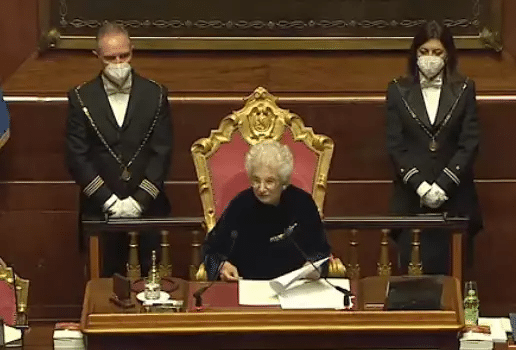Cecilia Prodi, an Italian author more renowned for her social media presence than her literary works, has gained notoriety as a fervent pro-Palestinian activist. Before Oct. 7, she had penned several books about Gaza and is particularly remembered for her provocative statement "I am in love with Yahya Sinwar." A week ago, authorities questioned Prodi at her Milan residence on charges of "incitement to racial crimes" and "severe defamation fueled by racial hatred."
The investigation was triggered by a lawsuit from Holocaust survivor Liliana Segre, arguably one of the most influential Jewish figures globally and undoubtedly the most prominent in Europe. Segre, who turns 94 this month, often describes herself as a full-time grandmother, but her impact extends far beyond that modest characterization.
Born in Milan, where she still resides, Liliana is an Auschwitz-Birkenau survivor. For the past three decades, since breaking her long-held silence about her experiences, she has devoted her life to Holocaust remembrance. As prisoner number 75190, she embarked on a journey across Italy, engaging with hundreds of thousands of students and sharing her harrowing story.
Segre's life took an unexpected turn in 2018 when Italian President Sergio Mattarella appointed her as a "Senator for Life" – the most prestigious position in the Italian Parliament, a lifetime appointment that cannot be revoked. Currently, Italy has five Senators for Life out of a total of 205 senators.
At 88, Liliana entered the national political arena, quickly becoming not just a respected senator but a cultural icon and social media influencer. She became a sought-after figure at cultural and fashion events, graced magazine covers, authored a bestselling autobiography, starred in a biopic, and delivered a historic speech to the European Parliament that resonated worldwide.
However, her rising profile also attracted an unprecedented wave of antisemitic hatred. She received death threats, hate mail, and social media posts calling for violence against her. At 90, she became the oldest person in Europe requiring constant security protection, unable to leave her home without three bodyguards. Yet, true to her resilient nature, Segre continued her public life undeterred.
Public support for Segre only grew stronger. Her name became synonymous with peace, patience, tolerance, strength, and courage. In December 2019, at the height of Milan's winter, tens of thousands of protesters, including about 600 mayors, filled Piazza del Duomo, marching in solidarity and chanting, "Liliana, you are not alone."
The landscape shifted dramatically after the Oct. 7 attacks. When Segre spoke out affirming Israel's right to exist and defend itself, while calling for the release of hostages, she faced immediate backlash. The undercurrent of hatred that had been building suddenly erupted. Overnight, Segre became a persona non grata, branded an enemy of the state. Social media fan pages that once shared her speeches and testimonies daily now condemned her, with some even deleting long-standing profiles dedicated to her.

The discourse turned increasingly hostile. Senators ceased their customary applause after her speeches, their silence more deafening than online threats. Television channels stopped extending interview invitations, and on International Holocaust Remembrance Day, she was advised to stay home to avoid potential confrontations.
Undeterred, Segre persisted. In her most recent public statement, she asserted that labeling the war in Gaza as genocide was false, stating that as a survivor of actual genocide, she knew precisely what it entailed. Predictably, this further inflamed public sentiment against her. Insults previously confined to the internet now permeated mainstream media. Pundits and commentators questioned, "How can a child who survived Auschwitz not defend the children of Gaza experiencing a second Holocaust?"
Last week, Segre made headlines again by unexpectedly filing a lawsuit against Cecilia Prodi. In early July, Prodi posted a video on her popular Instagram account where, with tears and a trembling voice, she declared her unforgiving stance towards Jews for their actions against her Palestinian friends. Prodi went further, stating, "I hate all Jews in the world, and all Israelis and Zionists. Every last one of them. You disgust me. If I ever see you hanging in the town square, I swear I'll be in the front row to spit on your corpse." The video went viral, garnering widespread praise. Followers commented, "You're a hero," "Bravo for your courage," and "You said what we all wanted to but couldn't."
Jewish communities in Italy grappled with how to respond to Prodi's inflammatory remarks, ultimately choosing inaction, likely to avoid further inflaming tensions amidst a surge of antisemitic incidents. A month later, Segre took matters into her own hands, deciding to sue Prodi personally. "A lifetime has taught me to be a free woman, and to fear nothing," the Holocaust survivor stated.
Prodi responded, saying, "She has no heart. What they're doing to Gaza's children today is worse than what was done to her in childhood. I know she's elderly, but I don't care – I hate old people too if they're evil." The court's ruling on whether Prodi's words constitute antisemitism remains to be seen. While the answer may seem obvious, in the current climate since Oct. 7, nothing can be taken for granted.




